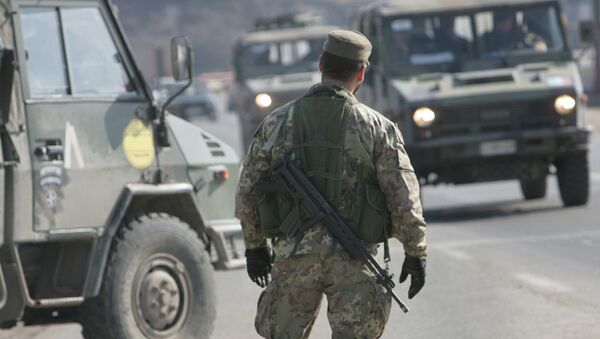MOSCOW. (RIA Novosti political commentator Andrei Fedyashin) - After visiting Afghanistan on August 6, the new NATO Secretary-General, Anders Rasmussen, made his second foreign trip to Kosovo on August 13, not to Iraq where NATO's second strongest contingent is deployed.
He did so not because Kosovo must be politically more important to NATO, which is supposed to devote more attention to Europe than the Middle East. It is more likely Rasmussen had to see for himself how bad the situation in Afghanistan was in order to understand what to do about KFOR (NATO's Kosovo force) in Kosovo.
This contingent is NATO's third strongest expeditionary force; and, according to the latest data, consists of 13,800 military personnel. Its mission is to maintain peace in Kosovo, but it has recently become a source of huge irritation.
The attitudes of the Europeans are easy to understand, especially considering that in July 75 soldiers were killed in Afghanistan, more than in any month since the start of the occupation in 2002. In other words, the contingent in Kosovo in addition to those in Afghanistan and Iraq is too much to bear. Now it will have to be cut.
Rasmussen's task this day is not even to determine who will cut the contingent, by how much, or when. This is not within his competence. He has to understand on site how the situation will develop, especially in the Serbian communities and at their borders given a NATO partial withdrawal.
Despite NATO bias in favor of Kosovo's Albanians, the contingent's soldiers from its countries are not politicians but normal people who try to do what they can to prevent clashes between the Albanian majority and the Serbian minority. There are many hotheads on both sides, although the Albanians have become much more nationalistic and aggressive toward the Serbs after winning their "independence." If KFOR is reduced or withdrawn from Kosovo, any spontaneous or targeted explosion of this aggressiveness will not be neutralized by a NATO buffer. This threatens Kosovo with a new war.
In this context, Rasmussen's mission was to bring home to the Albanian leaders that they should not go beyond the limits, and to receive at least some reassurances from them about their ability to keep their commandos in check, not to mention those who want to drive all Serbs from Kosovo. About 100,000 Serbs have remained in Kosovo, which has a population of 2 million. After 1999, 200,000 Serbs fled to Serbia.
This was the reason Rasmussen met with President Fatmir Sejdiu and Prime Minister Hashim Thaci, who was the commander over the Kosovo Albanian combat troops during the recent war. Rasmussen's meeting with KFOR Commander Giuseppe Emilio Gay is expected to reveal current conditions and where the first cuts could be made.
NATO has started expediting the withdrawal process in Kosovo. On June 2, its former Secretary-General Jaap de Hoop Scheffer announced that there will be no reductions because "they would undermine the successes achieved since 1999 (the year of KFOR's formation immediately after the bombings of Serbia)."
However, on June 10, NATO's foreign and defense ministers endorsed a reduction in NATO's force in principle. This must be approved by the Atlantic Council, but the outlines of the plan are already clear.
It will have three phases. First, in January 2010, NATO will reduce its troops in Kosovo by 10,000. Rasmussen has already said that by the end of his four year term he hopes to withdraw all NATO troops from Kosovo.
NATO does not seem to care too much about the fate of Kosovo's Serbs, who live in enclaves and are almost all under siege. He met with representatives of a number of Serbian communities, but these meetings typically just register each sides' positions. The Serbs have always been manhandled without kid gloves.
The opinions expressed in this article are the author's and do not necessarily represent those of RIA Novosti.



